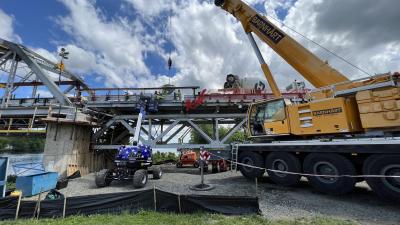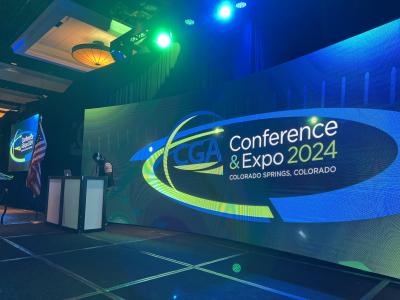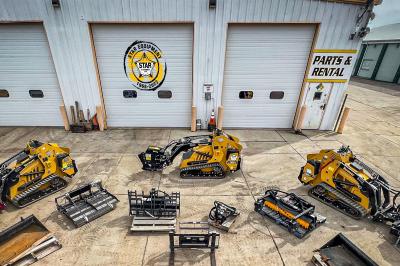A Kentucky Court of Appeals ruling in a case involving the construction of a condominium and garage in Covington, Ky., contradicts the Commonwealth's strong public policy that those who furnish construction materials or labor under written agreements must receive just compensation, the American Subcontractors Association told the Supreme Court of Kentucky.
A Kentucky Court of Appeals ruling in a case involving the construction of a condominium and garage in Covington, Ky., contradicts the Commonwealth's strong public policy that those who furnish construction materials or labor under written agreements must receive just compensation, the American Subcontractors Association told the Supreme Court of Kentucky. The appeals court's ruling precluded steel subcontractors from recovering payment for their extra-contractual work under a “pay-if-paid” contract clause and permitted the project owner to benefit from valuable extra-contractual work provided by subcontractors without payment, known as “unjust enrichment.” The appeals court decision, if left standing, could have a profound impact across Kentucky, where billions of dollars of construction work is either in planning or in progress.
In an amicus brief, filed on July 18, ASA urged the Supreme Court of Kentucky to reverse the appeals court's decision in Superior Steel, Inc. and Ben Hur Construction Company, Inc. vs. the Ascent at Roebling's Bridge, LLC, Corporex Development & Construction Management, LLC, Dugan & Meyers Construction Company and Westchester Fire Insurance Company.
The Kentucky Court of Appeals has set a “perilous precedent” in its decision, as it currently stands. ASA said the Court of Appeals erroneously reversed the Kenton Circuit Court on two bases: “First, it held that because Appellants entered into subcontracts with the general contractor, Appellee Dugan & Meyers Construction Company (“D&M”), Appellants could not, as a matter of law, prevail on an unjust enrichment theory against the Owner,” ASA wrote. “The Court of Appeals so held despite the undisputed fact that neither Appellant ever entered into any contract with Owner. Second, the Court of Appeals held that a pay-if-paid clause in the subcontract between Appellant Superior Steel, Inc. and the D&M (the “Subcontract”) precluded Appellants from recovering payment for their extra-contractual work.”
“Thus, in one fell swoop, the Court of Appeals completely and erroneously eviscerated Appellants' right of recovery for the significant labor and materials incorporated into the project,” ASA wrote. “The Court of Appeals' decision to deny recovery against the Owner based upon an unjust enrichment theory, even where there was no contract between Appellants and Owner, is contrary to well-established precedent in Kentucky and throughout the nation. Its approval of Appellees' incorrect claim that no case in the country holds that the owner is responsible under unjust enrichment when a contract is in place is erroneous where, as here, there was no contract in place between Appellants and the party who was unjustly enriched (the Owner in this case).”
The equitable doctrine of unjust enrichment “is applicable as a basis of restitution to prevent one person from keeping money or benefits belonging to another.”
Pay-if-paid clauses have the effect of stripping a subcontractor of its mechanic's lien rights and are, therefore, void under Kentucky's Fairness in Construction Act, ASA told the Supreme Court. “It has been the policy of Kentucky law to construe mechanic's liens liberally to protect those who furnish labor and materials,” ASA wrote. “Applied here, enforcement of the pay-if-paid clause of the Subcontract has the practical effect of eviscerating Appellants' lien rights. Appellants' mechanic's liens, which have been bonded off, are now left solely dependent on the outcome of this appeal. If the pay-if-paid clause is held applicable, and the Appellees are found not liable as a result, the effect is to strip Appellants of their lien rights. Such a result is wholly incongruous with Kentucky's strong public policy toward protecting the lien rights of suppliers and laborers.”
In the underlying case, the owner—Ascent at Roebling's Bridge, LLC—entered into a construction management contract in 2006 with the construction management company—Dugan & Meyers Construction Company—to provide construction management services for a 21-story, 72-unit condominium and garage project in Covington, Ky. The CM entered into subcontracts with a number of trade contractors, including steel subcontracts with Superior Steel, Inc. for various elements of the structural steel supply and fabrication and Ben Hur Construction Company, Inc. for the steel and metal decking erection and installation. The steel subcontracts each contained: (1) written change order requirements that all changes were to be in writing; and (2) a “pay-if-paid” provision, stating the owner's payment to the CM was a condition precedent to the CM's obligation to pay the steel subcontractors, Superior Steel and Ben Hur.
As the project started, the drawings were revised several times. Both Superior and Ben Hur made claims for the additional materials and extra costs related to the changes. Though the CM verbally directed the steel subcontractors to proceed with the extra work and keep track of their time and costs (apparently on the direction of the owner), no change orders to the steel subcontracts were executed. After the work was completed, the owner refused to pay for the extra work and the CM refused to pay the steel subcontractors, pointing, among other things, to the pay-if-paid clause in the subcontracts. As a result, after providing collectively hundreds of thousands of dollars in additional work, Superior Steel and Ben Hur filed mechanic's liens as security for their claims. The liens were bonded off, and the matter went to trial.
At trial, the steel subcontractors asserted breach of contract claims against the CM and unjust enrichment claims against the owner. The jury ultimately found that the steel subcontractors were entitled to over $400,000. The jury found (a) the CM liable to Superior and Ben Hur for the extra work claims, and (b) the owner liable to the steel subcontractors under the equitable doctrine of unjust enrichment. The Kentucky Court of Appeals, however, reversed.
The Appeals Court held that the steel subcontractors could not recover against the owner for unjust enrichment because “the contractual relationships that were in place … preclude the application of an equitable remedy.” The Appeals Court also reversed the judgment against the CM, holding that the pay-if-paid clauses “are essentially conditions precedent to performance under the contract.” Thus it was reversible error for the trial court not to have been “explicitly instructed” about the pay-if-paid clauses, and specifically that the failure of a condition precedent constitutes a legal excuse for non-performance. The Appeals Court brushed off the CM's verbal assurances of payment, saying it did “not agree that [the CM] waived these provisions by agreeing to pay for the extra work,” and reversing the judgment “[b]ecause the circuit court did not include such an instruction, the jury could not decide whether [the CM] had breached the contract.”
Today's top stories
















